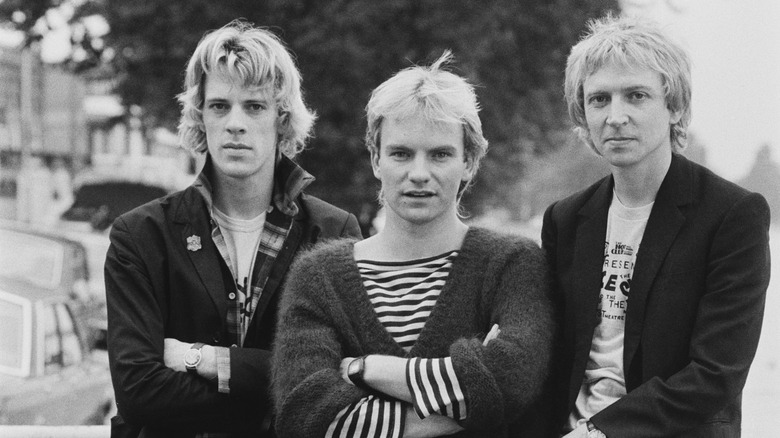How Every Breath You Take By The Police Changed Meanings After Its Release
"Every Breath You Take" by The Police has inspired countless think pieces, interviews, and hot takes. As with most writing, sometimes the meaning gleaned by audiences was intended by the writer, sometimes it wasn't — and sometimes it's a little bit of both. Meanings can change over time, and placing art into a social context can bring out themes that the artist hadn't fully realized. Let's back up a bit.
Since its release in 1983, "Every Breath You Take" has become ubiquitous. In 2019, it won the BMI award for the most played song on the radio, with almost 15 million plays at the time (per BMI). At first, it seems like a romantic song but a closer listen reveals the alarming lyrics. And unless you searched for an interview with Sting, it would be hard to know for sure what the song's original meaning was. Even if you had caught one of those interviews, his answers might differ slightly, depending on the year.
In 2022, "Every Breath You Take" is almost universally agreed to be anything but romantic; at best, it's just how technology works now. At worst, it's the theme song for someone obsessed with every [noun] you [verb]. But 1983 was a different time — was the song always meant to be prophetic?
How Sting feels about Every Breath You Take
As reported by Far Out Magazine, Sting wrote the lyrics to "Every Breath You Take" after he had just gone through a very public divorce with his first wife and mother of his two children, actress Frances Tomelty (via IMDb). Why so public? According to Honey, Sting had an affair with their next-door neighbor and friend of his wife, Trudie Styler. Yikes. Sting flew to Jamaica to get a break from it all, where he stayed at an estate that belonged to author Ian Fleming of "Bond, James Bond" fame. Late one night during his stay, pop music history would be made.
Sting said he woke up in the middle of the night with a song that didn't yet exist stuck in his head. He sat down at the piano and wrote the song in half an hour. Sting told BBC Radio 2 (via Far Out Magazine), "The song is very, very sinister and ugly. And people have actually misinterpreted it as being a gentle little love song, when it's quite the opposite."
So maybe he was thinking of stalking someone, planting surveillance equipment in their house, and following their car down dark side streets. It's admirable that a song written in a half hour would someday even cause someone to, say, give their smartphone or home speaker unit the side-eye. Clever Sting!
Sting thought he was just writing a hit song
Remember that time in poetry class when a fellow student got mad praise from the teacher for crafting a piece that touched on several universal themes, but you knew that he wrote it just before class and it was really just about how lousy he thought the cafeteria was, because you sat across from him when he was writing it, and he asked you for a three-syllable word that rhymed with "sloppy joe?" Hold up, this is relevant.
As Sting explained to The Independent in 1991 (per American Songwriter), "It sounds like a comforting love song. I didn't realize at the time how sinister it is." And, in a separate interview that same year, he elaborated that "[The song's protagonist] is trapped in his circular obsessions. Of course, I wasn't aware of any of this. I thought I was just writing a hit song."
So it appears that in the context of composing in the middle of the night while emotions were running high, perhaps Sting's focus was indeed more immediate. But in "The Independent" interview, he added, "I think I was thinking of Big Brother, surveillance and control." A song is a living piece of art and, when done well, changes meaning as society evolves.


